All About the Vixen!
by Steve Sullivan
Excerpted from Glamour Girls #16 SPRING 2002
Almost from the day she began dancing at the Losers, Erica had been hearing about Russ Meyer from Haji and Tura Satana. Haji’s long association with Russ Meyer began with her starring role in his 1965 biker-chick film Motorpsycho! A year later Tura starred as one of the most formidable leading ladies in screen history in the cult classic Faster, Pussycat! Kill! Kill!
“They kept saying, ‘don’t you think Erica should meet Russ? He'd just love her.’ But I never responded; I didn’t really know much about him. Then while sitting in the lobby of her dentist waiting for an appointment, Erica picked up the May 16, 1968 issue of Variety and saw this ad:
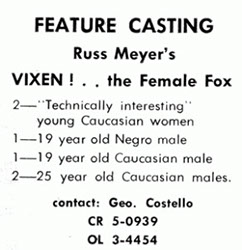
“When I saw that ad, it just clicked in my mind. The ad had legitimized to me what Haji and Tura had been saying. I’d never seen any of his films. I didn’t know he was the one who made The Immoral Mr. Teas, which was playing at The Vista Theater, up the street from where I grew up, near where Hollywood Boulevard and Sunset intersect. The ad was pretty tame, and I had no idea what kind of movie it would be. When it said ‘the female fox’, I didn't interpret that in a sexual way. I’d never even heard the word ‘vixen’ before that.’
Erica made an appointment and did a reading with Meyer’s right-hand man George Costello. “He had interviewed more than three hundred women. Russ was out of town. At the end of the interview, George said, kind of embarrassed, ‘before you leave, could you take your top off?’ Well, I knew I’d have to do that on screen, and he had to see. So I said, ‘yeah, sure!’ After you take your top off every night at the club, it’s almost like brushing your teeth. He said he’d discuss the candidates with Russ, and I might get a call back. I had no idea whether I would.
“Then, all of a sudden, they called me back. I met with Russ, and he said [imitating Meyer’s voice], ‘well, George thinks that because your bosoms aren’t as big as most of my girls, maybe women can relate more to you. And it would be a twist.’ It's funny, Russ can be so crass at times, but at other times he can be so gentle and sweet. She was hired, and the most celebrated chapter in Erica’s journey was about to begin.
“About two weeks after I was hired, we began filming. First, with everyone cast, he got us all together and screened Faster Pussycat for us, so we could see what kind of work he did. Next thing I knew, I was leaving town.” It was a Greyhound bus ride of a few hours north to the small town of Miranda, just below the Oregon border. Then she was driven about ten miles down a dirt road to a cabin owned by a friend of Meyer’s. “We were out in the middle of nowhere. Those woods just went on and on forever.” Filming ran from around the end of June 1968 into early August.
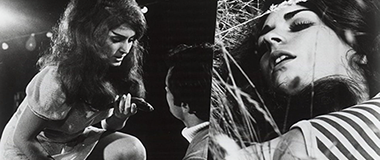
“The shoot ran for four and a half weeks. We had one or two rehearsals with George, just reading over the lines. I had no clue of what I was in for. It’s actually only now, looking back, that I can realize the impact of that film.”
Vixen is set in the Canadian bush country of British Columbia. Tom Palmer (played by Garth Pillsbury as one of those square-jawed but dimly oblivious leading men favored by Meyer) is a bush pilot who makes a living bringing in tourists for a vacation in the wilds. Away from home much of the time, he knows his bombshell wife Vixen likes to tease, “but she knows where to draw the line”—and as he speaks these trusting words to a client we see Erica frolicking with a rugged playmate who turns out to be a Canadian Mountie, ripping off her bikini top, and urging him to make love to her on the grass. Once the act is done, she declares, “we’ve had our fun, now it’s business as usual.”
We can see immediately that this over-poweringly sensual, dark, heavy-lidded beauty is a seductress who knows exactly what she wants, will do anything to get it and afterward will move on without a moment of any human emotion other than lust and personal gratification. She’s a racist, as demonstrated by her contemptuous comments toward Niles, the draft-resisting black friend of her brother Judd. And she’s shameless, as seen when she mockingly offers her body to Judd and expresses interest in making it with a couple of girls.
Tom brings home a married couple on a fishing trip, and then the fun begins. Vixen sets out to tantalize the guy at the barbecue, suggestively dancing above him in her form-fitting miniskirt (as Meyer shoot from below to look up her dress). She picks up a trout from the barbecue, fondles it with arched eyebrows, kisses it, and then puts the fish inside her blouse, while fisherman Dave is watching with sweaty, gape-mouthed desire, his wife Janet quietly seethes, and good old Tom stupidly goes on cooking. The two couples go fishing the next day, and Vixen offers to show Dave a new spot where he ‘can't miss.’ “You attract me—and when I'm attracted, I respond,” she murmurs heavily, unbuttoning her shirt. As they make love in the stream, she laughs in wicked, erotic pleasure. Vixen lives only for the moment, and the consequences be damned.
Meanwhile, poor Janet (played by curvy blonde Vincene Wallace) is the sexually frustrated wife, unable to compete with Vixen for the attention of her husband, and utterly failing in her efforts to come on to their host. When the men go off for lunch, Vixen stays behind with the depressed Janet at the cabin. Slowly and sensuously, Vixen takes control, removing Janet's bra and bikini bottom, and the suddenly aroused wife insists that Vixen strip as well. “So that’s what my husband was after,” cries Janet in examining her new pal’s bare torso. “Not bad, not bad at all!” Vixen trembles as Janet caresses her body; they snuggle and caress each other at length, and share a lingering kiss. Just as Vixen is reaching a peak of passion, they hear the men return, and they scramble to get dressed.

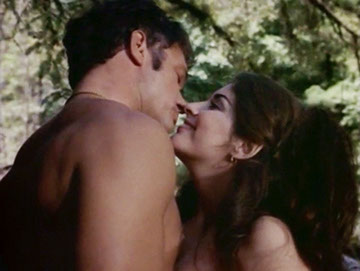
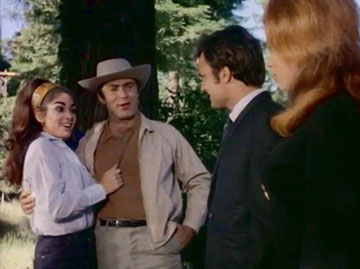
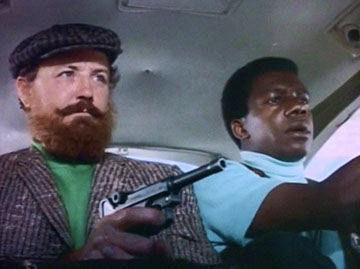
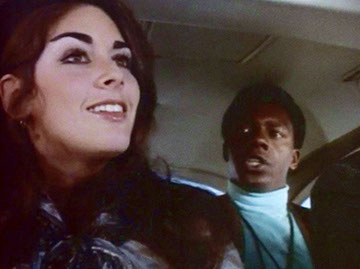
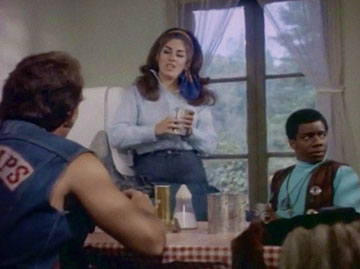
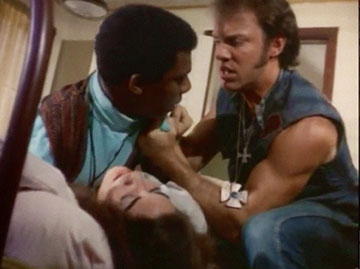
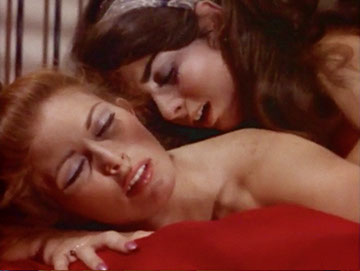
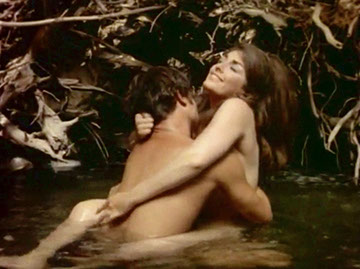

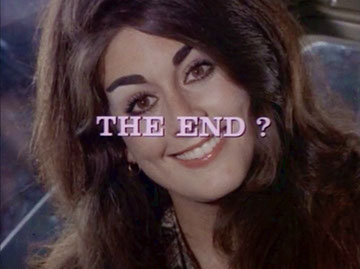
As if to underline the point that there is no depth to which Vixen will not sink, when brother Judd comes by to take a shower, she strips and joins him. She dares him to make love to her. “You've been asking for it,” he notes. “I certainly have, baby brother!”
As they finish up in bed, she appears ready to blow a gasket with conflicted emotions. Harrison Page, in the role of Judd’s friend Niles, comes upon them, and is ready to join in the fun despite her ugly taunts.
The film’s ‘socially redeeming’ climax comes when Tom’s new guest, Mr. O’Bannion, tries to persuade Niles to channel his rage over racism and the Vietnam War to join the newcomer in communism and hijack the plane to Cuba. Once in flight, O’Bannion struggles to seize control of the plane from Tom. Niles, making his decision, rips the gun from the bad guy’s grasp, and Tom knocks him out. The still-bitter Niles initially wants to return to Canada and remain free from draft charges, but he relents, and as they land in San Francisco, receives a smile from Vixen as he runs off. As a new tourist couple approaches the plane including a gorgeous brunette, Vixen licks her lips and grins salaciously at the camera at the conclusion.
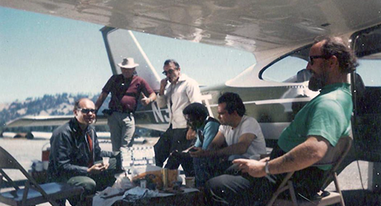
Filming with Russ Meyer “was work,” she emphasizes. “With Russ, you work. You were with him 24/7. I lived in the same house with him for over a month, and it wasn’t a big house. But it was great. There was such teamwork. It was a summer camp, like a family.”
As on every one of Meyer’s independent productions, the actors pulled double and triple duty. “I did the clapboards for my scenes, I steamed my own dress, I put on my own makeup and did my hair, putting on my fall. I painted my eyebrows to look more seductive. I even carried a camera sometimes.” Most of the time on the set, it was just Russ, myself, George Costello, Jim Ryan [another associate producer and Meyer’s longtime friend to this day], Richard Brummer [the film editor, who also worked on the sound]. That was it, aside from the other actors playing the scene.” Each actor came on the set for just a matter of days to shoot all of their scenes, then left.
“Russ had to have the hots for the women he works with. When you’re working with anybody who’s really passionate about something, you have to kind of fall in love with them. And we can trick ourselves. In a way, I fell in love with Russ, or else he wouldn’t have been able to get what he got out of me… Russ was so intense… Had I known then what I know now, I would have been able to appreciate it more. He protected me on the set, I knew no one was going to screw with me. For the first time, I felt safe in the entire environment with Russ.”
Meyer’s style as a director was simplicity itself. “It wasn’t like he explained what the character’s motivation were or anything—God, no! It’s just, set up the scene, the camera’s rolling, go. If you don’t want to do it the way Russ wants it, you have to bring something to the table to change his mind. When I tried something different and he liked the way I did it, he’d say, ‘oh yeah, do that again!’ Once I knew something worked, I kept bringing in more. I was trying to make Vixen not as much as a cartoon, but more like someone who could be your next-door neighbor. Sure, it’s a little far out, but the emotions in different situations are real enough. Like when her brother tries to screw her, and she freaks out.
“My perception of Vixen was that she was really troubled. She was a racist, yet also a moralist, and was fucking everyone in sight.”
The most intense sequence of the entire picture—for the director, the actors, and the audience—was Erica’s lesbian scene with Vincene Wallace. It was shot in about the third week of production. “It was very, very difficult for me. I didn't realize, and maybe he didn't realize at first, how important that scene was for him. It put a lot of pressure on me.”
“He told me about this girl who was a friend of his, who was in jail, and she told him that the way two girls did it was like two scissors, banging pussies. That freaked me out, because I couldn’t see myself feeling that way about two women making love. I mean, two scissors? Where are you going to shoot? From the middle? From my end? How could you even get a close-up of the two of them together? It was just a suggestion on his part, because he knew nothing else. Russ’ instructions just made more anxiety provoking.
“Three times I tried doing the scene, and each time he yelled ‘cut’ and said I wasn’t getting it. Each time he sent me to my room to think about it—‘when you're ready, come out.’ I was just hysterical and crying because I couldn’t make him happy. George talked to me to try and calm me down. Finally I realized that because Russ didn’t really know better, I could take it anywhere as long as he felt it.
“While we were doing the scene, Russ was talking because there was there was no voice on mic, so you didn’t have to worry about sound [with just music on the soundtrack]. He's going, ‘yeah! Keep it moving!’ He didn’t want to cut, so he’d move the camera to another position and say, ‘don't stop! That's great!’ He was actually pounding the floor with one hand in excitement, lying on his stomach while shooting.” She says it was well over 100 degrees in the room with the summertime heat and the lights. The atmosphere at that moment was even more superheated. Erica recalls with a chuckle that immediately afterward, Meyer called, ‘break for lunch! I’ve gotta change my shorts!’
Meyer typically concluded his films with epilogues that are even nuttier than everything that came before, offering a pseudo-profound moral to the story: Vixen was no exception. “I think he felt he had to bring it back to a moral ending to give the film the redeeming quality needed to get the film a certain category or rating. So he brings Vixen back and makes her a decent American at the end, helping to break up the hijacking of the plane—even though she fucked her way through the movie! With her brother, his friend, the tourist couple, the Mountie, the trout… It's pretty hysterical,” she says, laughing at the irony.
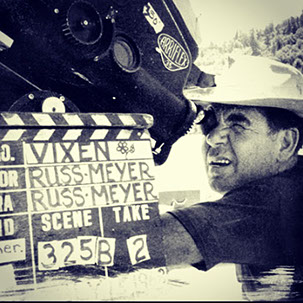
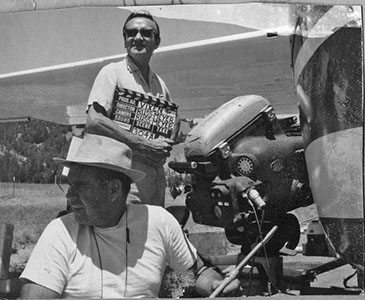
With that ending, Meyer had desperately hoped to earn the film an ‘R’ rating that would enable it to play in mainstream theaters. It did not work. Vixen became the first American film to be officially given an ‘X’ rating. (Swedish pictures such as I Am Curious (Yellow) had previously been rated as ‘X’.)
Local law enforcement officials in Florida, Georgia, Illinois, Michigan, North Carolina, Oklahoma, and Utah attempted to stop the film from showing. Ohio courts approved a permanent ban against Vixen (in five counties) as obscene because it depicted ‘purported acts of sexual intercourse’—in a case brought by future bank fraud felon Charles Keating (an irony of hypocrisy that gave Meyer great pleasure years later). It was also withdrawn from some theaters in Wisconsin. “Would you believe that today it’s still banned in parts of Ohio?” With a mischievous gleam in her eye, she suggests, “I would absolutely love to go to Ohio now and try to show Vixen at a theater, and let them arrest me if they dared. That’d be so cool!”
Nevertheless—and perhaps, in part, helped by publicity over the censorship battles—Vixen was a popular phenomenon unlike any previous film of it’s kind. The picture's official premiere was on October 15, 1968, but really began to generate a head of steam at year's end. It hit big in such key markets as Chicago, Los Angeles, San Francisco, and Denver. The film cracked the Variety national box office Top Ten on January 20, 1969 (just behind such films as Bullitt and Ice Station Zebra); it would earn more than $6 million in the U.S. on a budget of just $76,000. Meyer’s previous films always had a core audience, but he had never experienced anything like this before. It wasn’t just the box office grosses, but the fact that for the first time a Meyer film was playing in ‘respectable’ theaters—and that Erica's women-first screen persona was attracting a female as well as male audience.
Publicity for Vixen had the combination of lurid come-on and mock profundity that is uniquely Meyer’s:
ONLY A WILD ANIMAL IS OBLIVIOUS TO SOCIETY'S
INHIBITION OF INSTINCTUAL DESIRE
Only today’s demented society could make such an animal a woman... or such a woman an animal
Another promotional blurb reads: “Russ Meyer's Vixen will jerk your emotions—straddle your soul—jar your senses!”
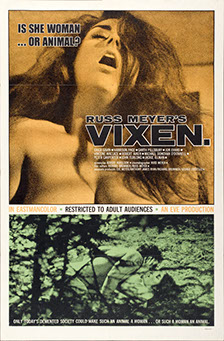
The national center of Vixen-mania was Chicago. Variety reported in February 1969 that the film was setting house records in the 585-seat Loop Theater, where it would ultimately run for an unprecedented forty-three weeks. At another Illinois venue in Aurora, Vixen played for fifty-four straight weeks. That was topped by an unbroken run of fifty-seven weeks at the Starlight Drive-In in Elgin, Illinois, which was reported a decade later as an all-time record for any drive-in theater. This was the background against which a young Roger Ebert wrote the review that would alter his life in the February 24, 1969 Chicago Sun-Times, declaring that Vixen was “the best film to date in that uniquely American genre, the skin flick. It is also a celebration of zestful direction and photography, and lot of the time it's funny.” The review led a delighted Meyer to hire Ebert to write the screen play for Beyond the Valley of the Dolls, and the two men began a long, seemingly unlikely association.
“I had no idea what to expect,” when the film came out, Erica admits. “I felt that if I’m going to have a chance, I’d better grab the chance while it’s in front of me” So she designed and paid for her own full-page ad in the March 6, 1969 Variety, quoting Ebert’s review and noting the film’s box office breakthrough. “Meet Vixen!” the ad offered invitingly. The film’s audience continued to expand as it rolled eastward; it’s New York premiere finally came in May.
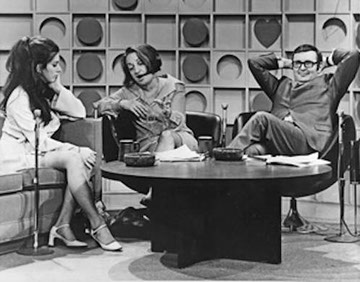
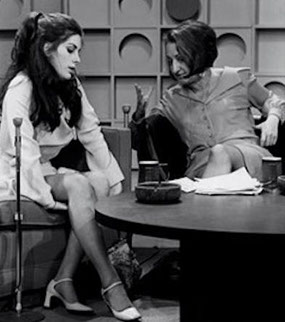
One dramatic event that brought home to Erica how Vixen was perceived in certain quarters was her appearance (along with Meyer) opposite feminist Betty Friedan on the local ABC talk show Chicago in early 1969.
“I was totally traumatized because she came out and started telling me I was disgrace to women. That took me by surprise. I’d never thought once about that before, but after that show, and after seeing the marchers protesting Vixen, part of me felt that maybe I should be standing up for women. Part of it was because I felt like I never fit in, and wanting to so badly. The women’s movement was so big at that time—women were burning bras, and here I was taking mine off! I didn't want to be seen dogging my own sisters. So for several years after that, I was critical of Vixen.”
Erica sees it differently now. “I really don't feel that what I was doing was putting women down. Vixen was totally on top. I think it’s great when you can feel that control in a sexual way.”
It wasn’t until she saw the Vixen laser disc with Meyer’s commentary that Erica discovered that Vincene Wallace had snuck into his room and given him a blow job in the middle of the night. “The things he has to say in the laser disc are so insightful about his playfulness. He’s a trip. He really has a gift for perception as to people—about their real selves, their fantasies, and how someone’s fantasies can become their reality. He sort of sees their reality and makes it into a fantasy on screen. Then you find out later that he wasn’t far off!”
It’s odd, the way he cast me, I have totally been Vixen—and loved it! It’s really amazing. I wasn’t that way until after I played the part. How did he know?” she chuckled.
Over the course of working on Vixen, a new relationship began with Meyer’s trusted assistant George Costello. “He and I kind of fell in love, and had an affair that lasted about one to two years [until Spring 1970]. Russ was devastated—he never, ever forgot it, to the point where he wouldn’t work with George again.” Indeed, Vixen would be the last Meyer film on which Costello is credited. “I think Russ feels that with his leading ladies, he’s the only one who can make love. He feels like he makes love through the camera.”
“Once you become a Russ Meyer girl, in his mind you almost become like the Virgin Mary, no one can fool around with you and especially not one his own people. He’d never admit he was jealous, but I’m sure that what it was.”



